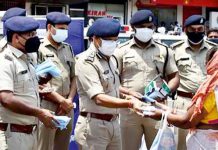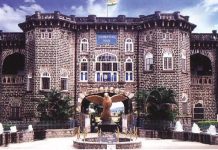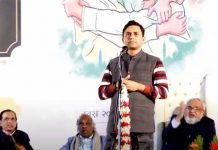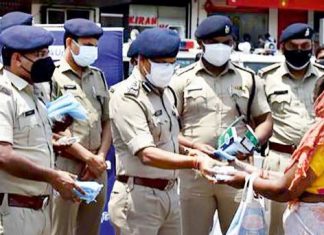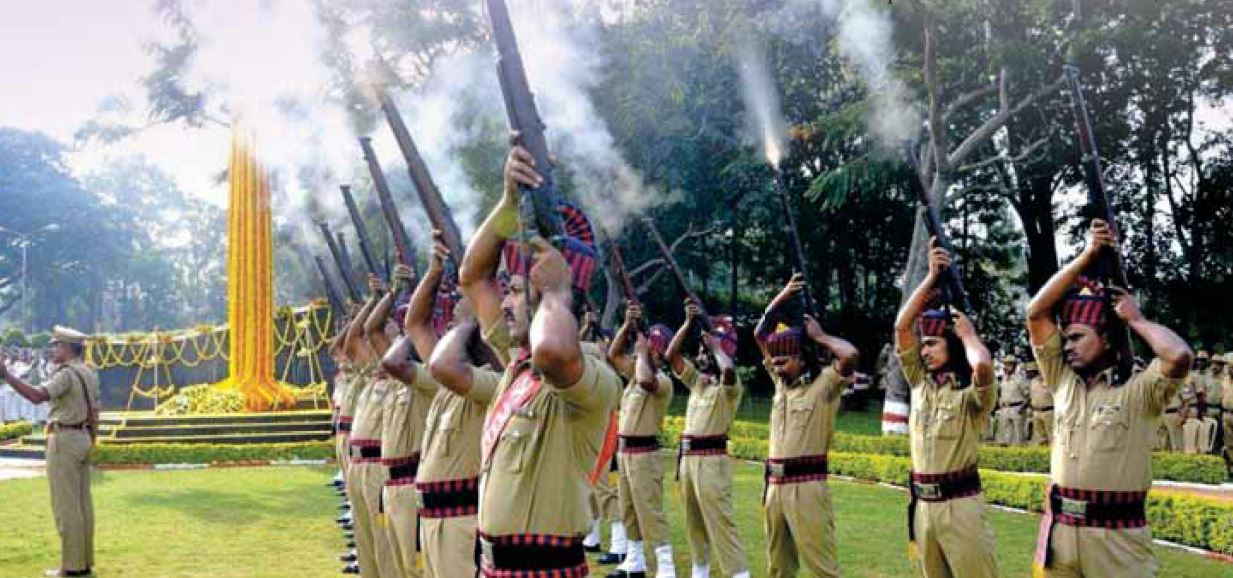
The police are the first responders to any type of emergency. Most crimes, law and order situations, and information about violations of law are reported to the police control room first. Be it a terrorist attack, ordinary crime, law and order situation or disaster of any kind, citizens would choose to call the police for assistance. While attending to these situations and other responsibilities, the police provide a peaceful, safe and secure living environment to the residents. There are no activities – social, economic or educational – that could succeed without the protective umbrella the police provide.
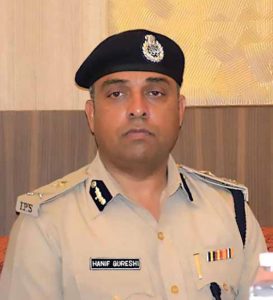
To cater to the ever-increasing demands of their profession, the police are in a continuous process of reinventing and reforming itself. Pre-Independent citizens of India saw the police as an instrumentality of the British Rule. The police were often used to quell the internal disturbance, and they used extreme force to silence any voice of protest. After Independence, the police reformed itself from the image of a force to that of a service organization. The term change from ‘Imperial Police’ to ‘Indian Police Service’ reflected that transformation. The police came to be recognized and identified as the helping hands – helping people no matter the hour – be it in disaster management or providing a wide umbrella of security services to the citizens.
The most important resource for police is its human element. It is the officer on the street who interacts with citizens who need care and attention. Their round-the-clock duty is arduous, taking a toll on not just their health but on their families as well since they cannot afford to spend much time with them. Their families do not know when they will return from work, and sometimes, they never do.
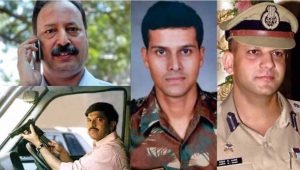 Police officers make the ultimate sacrifice for their nation; laying down their lives while in the line of duty. From September 2017 to August 2018, a total of 424 police personnel were killed while performing their duty. Out of these, 67 belonged to the Uttar Pradesh Police, 46 from the Jammu and Kashmir Police, 42 from the BSF, 34 from the ITBP and 27 from the CRPF. Since India’s Independence, a total of 34,844 (till August 2018) police personnel have sacrificed their lives safeguarding the integrity of the nation and providing security to people of this country. According to the National Crime Records Bureau, the reasons for these deaths were operations against terrorists and extremists, mob violence, attacks by criminals, anti-Naxal operations, deaths during disaster relief operations, and cross-border terrorism.
Police officers make the ultimate sacrifice for their nation; laying down their lives while in the line of duty. From September 2017 to August 2018, a total of 424 police personnel were killed while performing their duty. Out of these, 67 belonged to the Uttar Pradesh Police, 46 from the Jammu and Kashmir Police, 42 from the BSF, 34 from the ITBP and 27 from the CRPF. Since India’s Independence, a total of 34,844 (till August 2018) police personnel have sacrificed their lives safeguarding the integrity of the nation and providing security to people of this country. According to the National Crime Records Bureau, the reasons for these deaths were operations against terrorists and extremists, mob violence, attacks by criminals, anti-Naxal operations, deaths during disaster relief operations, and cross-border terrorism.
Sometimes, when a police officer leaves his home, he does not know what to expect. Yet, he does not hesitate to fulfil his responsibility and calling. For instance, when Hemant Karkare, Chief of the Mumbai Anti-Terrorist Squad (ATS), had completed his duty for the day and was having his dinner at home that fateful evening on November 26, 2008, he came to know about a firing incident at the Chhatrapati Shivaji Terminus. He took a couple of police officers along with him to investigate and take control of the situation. Platform 1 at the Terminus was deserted when he got there. He was then informed that the terrorists had moved to the Cama and Albless Hospital. On the way to the hospital, Karkare and his men were ambushed and shot dead by one of the terrorists, Ismail Khan, who was with Ajmal Kasab (the terrorist who was later captured and eventually hanged).
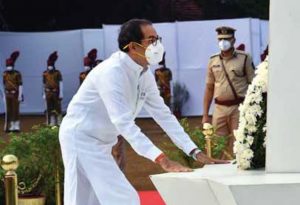 Another brave cop of the Mumbai Police was Vijay Salaskar of the Anti-Extortion Cell. He accompanied Hemant Karkare that fateful evening. He fought bravely but finally fell to a volley of bullets. The Additional Commissioner of Mumbai Police, Ashok Kamte, was also part of the team accompanying Karkare. Kamte, a fearless and compassionate officer also made the supreme sacrifice. As famously said by Napoleon Bonaparte, “It is the cause, not the death, that makes the martyr.” These heroes believed in a cause higher than themselves. They answered the nation’s call to serve and to protect. There is no greater sacrifice than to lay down one’s life in the service of the country.
Another brave cop of the Mumbai Police was Vijay Salaskar of the Anti-Extortion Cell. He accompanied Hemant Karkare that fateful evening. He fought bravely but finally fell to a volley of bullets. The Additional Commissioner of Mumbai Police, Ashok Kamte, was also part of the team accompanying Karkare. Kamte, a fearless and compassionate officer also made the supreme sacrifice. As famously said by Napoleon Bonaparte, “It is the cause, not the death, that makes the martyr.” These heroes believed in a cause higher than themselves. They answered the nation’s call to serve and to protect. There is no greater sacrifice than to lay down one’s life in the service of the country.
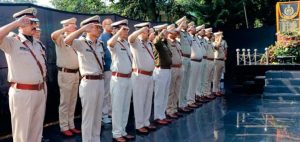 Sometimes, militants launch targeted attacks against policemen. Mohammad Asharaf Dar, 45, was a Sub-Inspector posted in Central Kashmir. He had come home on leave to meet his wife and three children in Larve, a tiny village in Pulwama district, a scenic place with apple orchards and paddy fields. He was killed in his kitchen in front of his one-year-old daughter on Eid-ul-Azha, a holy festival, in August 2018. The region was simmering with tension since the death of Burhan Wani, a charismatic military leader, by security forces in July 2016. Police forces have an underlying fear of being eliminated at any time, yet they bravely carry on with their duty.
Sometimes, militants launch targeted attacks against policemen. Mohammad Asharaf Dar, 45, was a Sub-Inspector posted in Central Kashmir. He had come home on leave to meet his wife and three children in Larve, a tiny village in Pulwama district, a scenic place with apple orchards and paddy fields. He was killed in his kitchen in front of his one-year-old daughter on Eid-ul-Azha, a holy festival, in August 2018. The region was simmering with tension since the death of Burhan Wani, a charismatic military leader, by security forces in July 2016. Police forces have an underlying fear of being eliminated at any time, yet they bravely carry on with their duty.
Policing is a unique occupation which comes with more than its fair share of job stress. Most officers attend to their arduous tasks ignoring their families and their health. Law enforcement officers must operate 24 hours a day, every day, including holidays. When unexpected issues and emergencies arise in the community, officers may need to stay past their normal shift or report back to duty even when on leave. Considering these factors, police personnel have very long working hours, which result in stress.
Officers are likely to encounter violent and other disturbing situations not typically seen by people in other occupations. Besides, officers deal with confrontational citizens and willing suspects. They sometimes need to work in unpleasant conditions, such as very hot (or very cold) and humid weather and often deal with political pressure in the workplace. Policing requires work roles that are not typically found in other occupations. Officers need to be level-headed at all times, suspicious, detached and forceful. These roles are not typical of the roles needed for supportive, friendly, and nurturing relationships with family members and friends. Just like everyone else, they can have problems in their home lives. Negative family issues can result in a lack of concentrated effort in being successful with job tasks, which can weigh on a person, resulting in frustration at work.
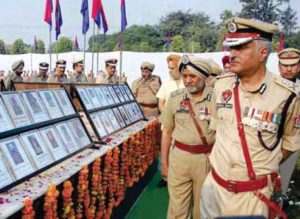 The situations which police officers encounter in their daily routine can be emotionally draining that they can be painful. They may find themselves rescuing a battered wife from her husband and then filing a case against him, even though the wife may not want to proceed with the investigation. They rescue young girls who have turned to prostitution due to lack of social care or due to human trafficking. They would stand in the rain for hours managing traffic when traffic jams threaten to throw life out of gear. They would try to stop a vehicle which had just run over a pedestrian, and in the process, may get hurt or killed. They would sit for hours looking for patterns into data to catch cybercriminals. They would patrol the city streets beyond their duty hours when a major festival or fair is on so the merry-making public is provided with a safe environment. Countless officers undertake such long and gruelling tasks not because of their job, but because of a higher calling towards society. Some get recognized and rewarded, but most do not. Yet, they carry on with their work, day in and day out, on weekends, on festivals, and other holidays when their families are away and waiting for them.
The situations which police officers encounter in their daily routine can be emotionally draining that they can be painful. They may find themselves rescuing a battered wife from her husband and then filing a case against him, even though the wife may not want to proceed with the investigation. They rescue young girls who have turned to prostitution due to lack of social care or due to human trafficking. They would stand in the rain for hours managing traffic when traffic jams threaten to throw life out of gear. They would try to stop a vehicle which had just run over a pedestrian, and in the process, may get hurt or killed. They would sit for hours looking for patterns into data to catch cybercriminals. They would patrol the city streets beyond their duty hours when a major festival or fair is on so the merry-making public is provided with a safe environment. Countless officers undertake such long and gruelling tasks not because of their job, but because of a higher calling towards society. Some get recognized and rewarded, but most do not. Yet, they carry on with their work, day in and day out, on weekends, on festivals, and other holidays when their families are away and waiting for them.
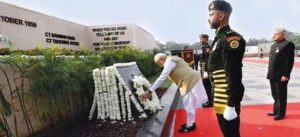 Abraham Lincoln observed, “A nation that does not honour its heroes will not long endure.” The least we can do is to remember our heroes and cherish the values for which they stood, fought, and ultimately laid down their lives. Heroes serve as our role models who inspire the nation.
Abraham Lincoln observed, “A nation that does not honour its heroes will not long endure.” The least we can do is to remember our heroes and cherish the values for which they stood, fought, and ultimately laid down their lives. Heroes serve as our role models who inspire the nation.
This way, we honour our martyrs who made the supreme sacrifice for our country. We remember the thousands of police officers who bravely fight injustice and instil pride in the nation. They inspire us to work for this great nation. The role of the police in fighting against crime, maintaining peace and security within the county, and the defence forces who protect our borders from external enemies, make India one of the world’s greatest and vibrant democracy.

